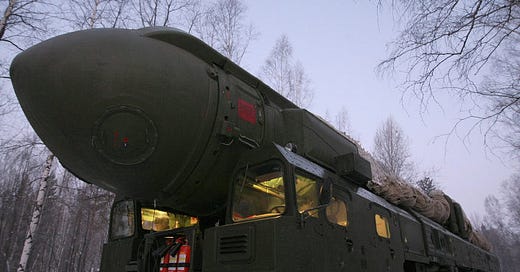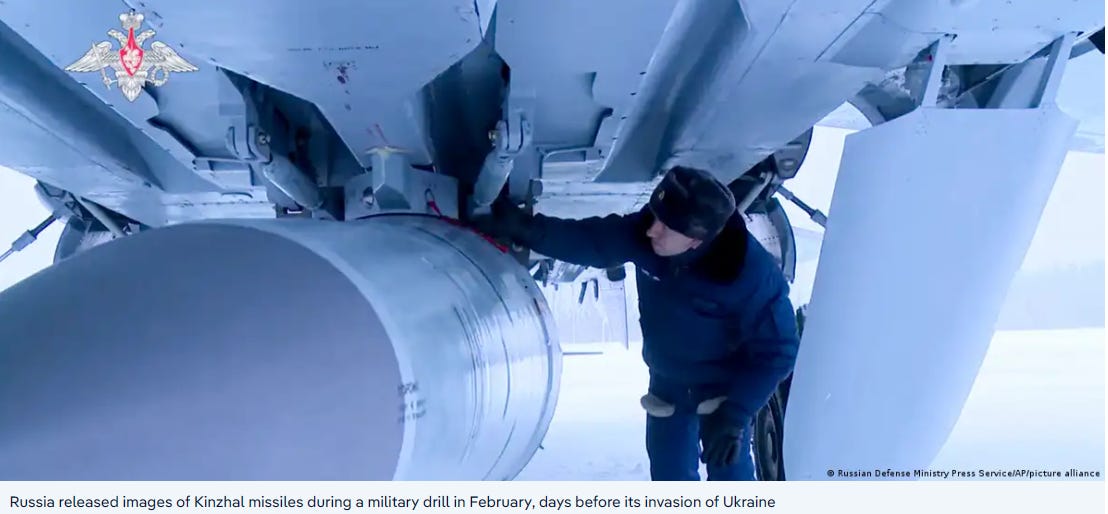MUTUALLY ASSURED DESTRUCTION: Russia can still launch its entire nuclear arsenal even if all Russians are dead.
Dead Hand can automatically launch the entire Russian nuclear arsenal in response to a nuclear attack.
By Kevin Hughes
April 4, 2024
Russia currently has the largest arsenal of tactical and strategic nuclear weapons in the world. All of these weapons are tied to a system known as the Perimeter, also known as the "Dead Hand," an automatic nuclear weapons control system that could launch the entirety of Russia's nuclear arsenal.
Russia has an estimated 1,549 deployed strategic warheads on 540 strategic delivery systems like intercontinental ballistic missiles or ICBMs, submarine-launched ballistic missiles and heavy bombers.
Russia also has an estimated 4,489 strategic nuclear weapons in military stockpiles. This makes Russia the largest nuclear power, beating the United States with approximately 5,100 deployed and stockpiled nuclear warheads.
In times of extreme crisis, including a nuclear first strike from the U.S., a high-ranking Russian government official or military commander could activate the Dead Hand, guaranteeing that Russia could respond to a nuclear attack even if the entirety of the Russian Armed Forces were wiped out.
This is the only purpose of the Dead Hand system.
The creation and deployment of the Dead Hand as an active military system of the former Soviet Union was done as part of the Cold War doctrine of "mutually assured destruction," a means by which a nuclear attack was deterred by ensuring that the side who initiated a first strike would also be annihilated by retaliatory nuclear strikes.
Dead Hand can automatically launch the entire Russian nuclear arsenal in response to a nuclear attack.
It is still not entirely known how the Dead Hand works. But the assumption is that a command-and-control system measures communications on military radio frequencies, radiation levels, air pressure, heat, and short-term seismic disruptions.
If the measurements appear to confirm that Russia is under nuclear attack, the Dead Hand begins a sequence that ends with Russia firing all of its ICBMs and other nuclear assets.
The Dead Hand would launch a command rocket, equipped with a radio warhead that communicates launch orders to Russian nuclear silos, even with the presence of radio jamming. Several tests demonstrated the operability of such a command rocket.
(Related: (Russia's new NUCLEAR MISSILE test a WARNING to America.)
The Dead Hand system was made operational in 1985, but confirmation only came in 2011 when Russian Strategic Rocket Forces Commander Gen. Sergei Karakayev said during an interview with a Russian newspaper that the system could destroy the U.S. within 30 minutes.
Further pronouncements from Russian state-owned media outlets further suggest that the system has been upgraded to include radar early warning systems and new hypersonic missiles.
Russia used hypersonic weapons in Ukraine. They are extremely fast and can evade interception for longer than conventional ballistic missiles.
The Dead Hand is supported by radar systems within Russian territory and satellites that collect intel from space that is funneled through a complex computer system that constantly analyses a wide range of parameters, including seismic activity and radiation levels.
"The system passed several modifications throughout the years of exploitation," explained Ivan Konovalov, development director with the Russian think tank the Foundation for the Promotion of Technologies of the 21st Century.
"First of all, Russia integrated into its new means of radio-electric intelligence such as Voronezh class radars capable of detecting missile launches up to 7,000 kilometers away," he continued.
"Secondly, engineers modified its warhead to withstand new emerging means of electronic warfare that shut down radio signals."
Konovalov added that nuclear missiles tied to the Dead Hand are in line to receive hypersonic missile blocks, which would allow them to fly at speeds of five to seven kilometers per second (three to four miles per second), making them nearly impossible to shoot down.
"The new missiles will be integrated into the military alongside new Sarmat class ICBMs. The latter missiles will be added to the military in the mid-2020s. So, the modified hypersonic version of the Dead Hand's missiles will appear alongside them," Konovalov said.
READ MORE:







